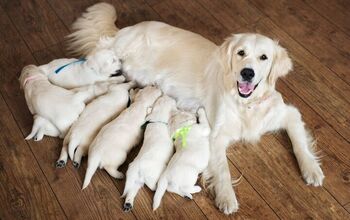Can Dogs Get Hiccups?

Nobody likes hiccups, least of all dogs! That’s right – dogs can get hiccups just like humans. Those pesky little rhythmic contractions of the diaphragm can go on forever, producing that classic “hic” sound and annoying everyone, starting with the one who is hiccuping, even when it’s your pooch. If you are surprised to learn that dogs can get hiccups, read on to find out what causes it and how to stop it.
Why Do Dogs Get Hiccups?
Hiccups are not a serious issue and they occur in dogs for the same reasons they appear in humans. They are brought about by an involuntary spasm of the diaphragm muscle. This is immediately followed by a sudden closure of the vocal cords, resulting in the classic hiccup sound. But still, there are several reasons why these spasms might occur. Here are just a few:
- Eating too quickly:
If your pet consumes water or food very quickly, they might swallow air as well. The excess air can irritate the diaphragm and result in hiccups.
- Too much excitement or stress:
When a dog is nervous, too excited, or in a stressful situation, they can also hiccup. This most often occurs in puppies, who are generally much more excitable than adult dogs.
- Digestive upset:
Dogs are voracious eaters and won’t be picky about their food. Sometimes, however, they can have digestive issues such as indigestion and gas. This then irritates the diaphragm, leading to hiccups. This is the most common occurrence, and results from the dog eating something that doesn’t really agree with their stomach – if you have an indiscriminate eater in your household, it pays to have activated charcoal on hand to ease their tummy troubles.
- Fast breathing:
Excited and playful doggos may start breathing really rapidly. This increased breathing rate might sometimes lead to hiccups.
However, something that most pawrents want to know is whether or not you should be worried about hiccups in dogs. In most cases, hiccups are entirely harmless. They resolve on their own after a few minutes, just like in humans. So, for the most part, hiccups are a truly benign condition and do not indicate underlying health issues. Also, keep in mind that they appear much more often in puppies, and as the dog grows older, the hiccups become rarer.
Nevertheless, there are some very rare cases in which hiccups can point to an underlying issue or some other condition. So, if the hiccups seem particularly persistent and reappear too often, it should be good to seek the advice of your veterinarian. Rarely, this can be a sign of gastrointestinal problems, reverse sneezing, or even respiratory issues.
Of course, there are several ways through which you can help minimize hiccups. One of them is to encourage slow eating. If you suspect that voracious eating is the cause of hiccups, try investing in a special slow feeding bowl for dogs, which can prevent them from gulping all the food at once. Besides this, you should always encourage regular exercise. This can lead to good digestion and normal breathing patterns, helping hiccups subside.
But ultimately, hiccups are nothing you should worry about, in 99% of cases. Most doggos will experience this from time to time, and in a few minutes, they usually stop. Nevertheless, any odd behavior you notice related to hiccups should warrant a trip to the vet.

A proud mama to seven dogs and ten cats, Angela spends her days writing for her fellow pet parents and pampering her furballs, all of whom are rescues. When she's not gushing over her adorable cats or playing with her dogs, she can be found curled up with a good fantasy book.
More by Angela Vuckovic

























